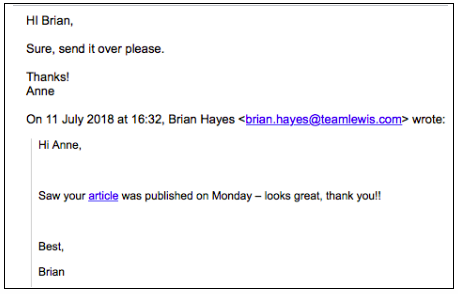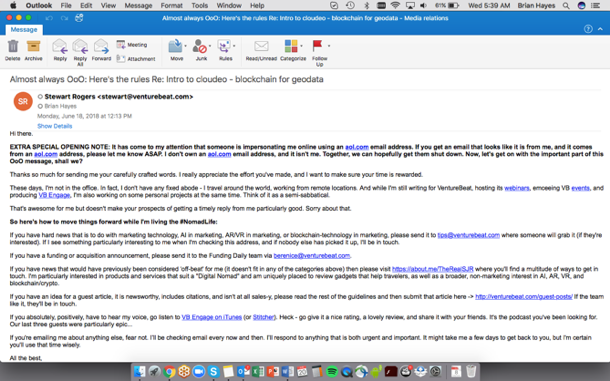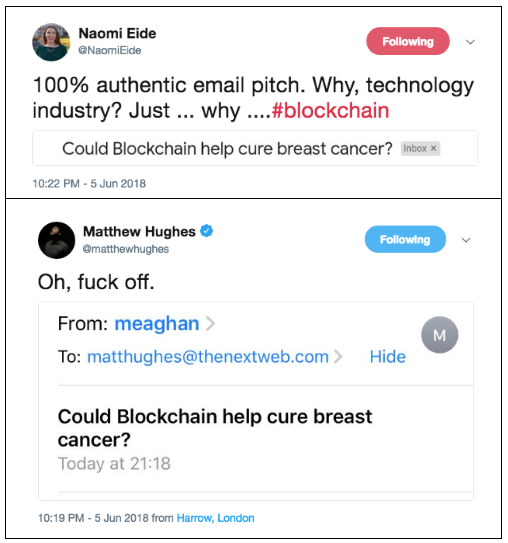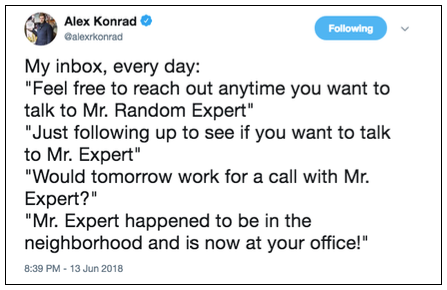
Sometimes it’s blunt.

Yes, he responded to my pitch with an empty email and just changed the subject to “UNSUBSCRIBE.”
Sometimes it makes no sense at all. (This wasn’t a pitch, but she treated it like one.)

Sometimes it’s an outrageously long auto-response. (Please don’t even try reading it; I had to enlarge the email to fill my whole computer screen just to screenshot the dang thing. And we’re the ones who need to respect journalists’ time…)

But other times, their feedback is incredibly helpful. For example, I was recently pursuing briefings for the CEO of Verto Analytics around how audience measurement is being impacted by evolving technology, including voice-enabled technology. I referenced stats around the growth of voice-enabled technology, mentioned that it’s adding deeper context that will open the door for the next wave of behavioral insights, and offered a conversation on the topic – and one reporter said:
“Pitch me a story, not just data points or offering up an exec.”
He was right. I provided a topic, and data, but no information around how evolving technology actually is impacting audience measurement, such as how voice-enabled technology is generating additional context and why that matters. How could I expect him to commit to a call without any more specifics? I needed to at least provide a glimpse into the CEO’s thoughts, beyond just the topic.
While the feedback isn’t groundbreaking, it’s something we need to keep reminding ourselves. It’s easy to focus our pitches too heavily on our client companies and executives, especially when they don’t have any new insights to share around breaking news stories or industry trends but continue pushing for more interviews. And it doesn’t help that we’re always hearing about our clients and executives.
One way to ensure you’re pitching a story is identifying and emphasizing the impact.
In my Verto pitch, for example, I could have explained that voice-enabled technology is allowing audience measurement firms to track deeper metrics like engagement and retention, as opposed to just reach – and I could have hinted at how audience measurement firms are changing their data collection strategies accordingly, and how that’s impacting their market reports.
Steve Ragan, senior cybersecurity reporter for CSO, discussed the importance of impact in a recent LEWIS Media on the Move newsletter. “If the pitch can demonstrate impact, it gets my attention. A good deal of my story development process follows a basic pattern. Pain – what is the pain, why does it exist, where did it come from? Impact – what impact does this pain have on a person or organization? Resolution – what can you do to fix the pain? Pitches that come close to aligning to that will always get a read.”
Impact is critical, but don’t overstate it either. That could get you blasted…
Here we have two reporters who tweeted about their disgust about the same overstated pitch:

Impact is one of the primary elements of newsworthiness, so it makes sense that it helps us focus our pitches around a story. Considering some of the other elements can also help.
- Conflict – What’s the conflict, challenge or need? This is what Steve Ragan referred to as the “pain”
- Timeliness – Why does this matter now?
- Proximity – Does it closely relate to any trending topics?
- Oddity or surprise – Is anything highly unusual? (Extreme competitive differentiators?)
- Prominence – Why is the spokesperson significant?
We have to be cautious with the “Prominence” point, because we generally don’t want to focus too heavily on the spokesperson we’re offering. Of course, if they are famous or truly outstanding for some reason, explain that. But if they aren’t, we need to explain why they’re credible on the topic. Otherwise, they’ll be just another Mr. Random Expert…
Another reporter complaining about PR pitches on Twitter:

I like to wait until the end of the pitch to include the spokesperson’s name, because it generally isn’t critical to the story and it can bog down the important details. Same for other company-focused proper nouns that don’t add critical information or otherwise boost the news value. We don’t want to be salespeople who push our company’s marketing messages on journalists; we want to be partners who provide them with useful information and story ideas.
Need help pitching your story to journalists? Don’t hesitate to reach out.



